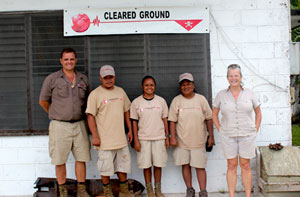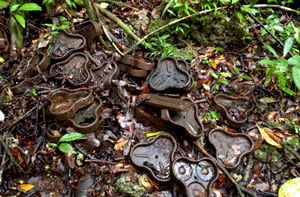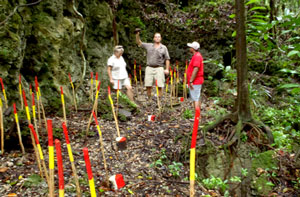In 1944, one of World War II's fiercest Pacific battles took place about 800 kilometres east of the Philippines on Peleliu Island in the Republic of Palau.
US records show almost 600 tonnes of bombs were dropped from the air, with another 2200 tonnes of shelling coming from an intense and sustained battleship bombardment.
The war was devastating. More than 13 000 people lost their lives. 67 years later, remnants of the battle continue to take the lives of the innocent people of Palau, with thousands of Unexploded Ordnance (UXO) littered across the country.
Unexploded ordnance – including landmines, cluster munitions and other explosive remnants – are a significant barrier to sustainable development. They continue to kill and injure indiscriminately long after wars and conflict have ended. They undermine the economic potential of affected lands. They deprive people of access to basic needs, such as water and health facilities. There is often no record of their location, and they can be found anywhere – on roads, in forests, along borders, around houses and at schools.
Too often, casualties of these explosive remnants are children.
In Palau, UXOs threaten locals during their subsistence food gathering for land crabs and bats. They also threaten tourists and tourism operators who dock their dive boats directly above sites where 1000 pound bombs have been uncovered. Children in Palau have also been known to present live grenades with pins pulled out for school history projects.
Much of the unexploded ordnance in Palau is in a poor state of decay, unstable and leaking chemicals into both the land and sea. One unexploded device on Koror, Palau's largest and most populated island, exploded and damaged a power plant. The area had no power for more than six months, causing significant disruptions to service provision throughout the island, including in the tourism industry. In response to these threats, Australia has committed $1.3 million in 2012 to support the work of Cleared Ground Demining, an independent not-for-profit organisation that specialises in UXO removal.
Since beginning work in Palau two-and-a-half years ago, the organisation has successfully destroyed more than 11 500 dangerous explosive remnants.
Australia's support will result in:
- an improved quality of life for families and communities affected by UXO
- prevention of UXO-related deaths and injuries
- improving Palau's capacity to manage its mine action programs.
Australia has made significant contributions to global efforts to reduce the threat and impact of landmines and other explosive remnants of war. Since 1997, Australia has provided more than $200 million, making us the sixth largest contributor to mine clearance efforts in the world.
These efforts are reflected in Australia's Mine Action Strategy 2010-2014, which guides the aid program's $100 million commitment to international mine action assistance. Through this strategy, Australia supports partner governments in 21 affected countries across the Asia–Pacific, the Middle East and Africa to work towards a world free from devastating landmines and cluster munitions.
More information
Australia's Mine Action Strategy for the Australian aid program 2010–14
Aid issue: Mine action
Mine action activities 2010–2011
Blog: The business of clearing a lethal legacy in Laos



